 |
||||||||
Profile
Gerry Meisels: The Challenge of a Lifetime

Over the past 35 years, former USF provost and long-time chemistry professor Gerry Meisels has written more than 100 papers on topics as esoteric as “The Unimolecular Decomposition Rates of Energy Selected Methylnitrite and Deuterated Methylnitrate Ions.” As founding director of the Coalition for Science Literacy, however, Meisels has taken on the challenge of his lifetime.
Working with organizations ranging from the National Science Foundation to the Florida Chamber of Commerce and Hillsborough County Public Schools, Meisels is helping to develop tools and processes that teach science more effectively, particularly at the critical kindergarten to fifth grade level.
It’s a multi-faceted problem, he says. “First, elementary school teachers don’t teach because they love science – they love the kids. Most of the time they’re more comfortable with reading and soft sciences.”
That distress shows up in student attitudes. “Surveys taken in the third grade typically show that about three-quarters of students feel positive about science,” he said. “By the sixth or seventh grade, only about one-third of students feel that way.”
Other research shows that the best way to teach kids science is to get them involved in the process, but even that may need a kick start because kids and teachers are often most comfortable learning by rote. The point really hit home for Meisels when his daughter came to him with a science course question while he was chair of the chemistry department at the University of Nebraska. “I thought I’d help her figure it out by asking leading questions,” he recalls. “She finally asked me if I knew the answer or not and, if I did, to just tell her what it was.”
More recently, Meisels worked with a team of scientists to develop a new course for non-science majors that used the same process of involving students by asking leading questions. “The students didn’t like it because it made them think. Freshmen don’t like to think, they prefer to memorize.”
Leaders at both the national and state level are beginning to address the issue as they recognize how important science education will be to economic development. “The National Science Foundation is predicting that 70% of jobs will require at least some math and science skills, but only about 10-20% of students are motivated to learn,” Meisels said.
At the state level, the Florida STEM (Science, Technology, Engineering and Math) Council is working to connect education, workforce, business and economic development leaders to identify needs and increase educational opportunities. “Business needs to step up to the plate and keep pressure on the legislature,” he said. “If we really expect to see change, there must be a significant investment.”
One of the options being considered is putting science experts in elementary schools — much like music teachers or PE coaches – to involve students early on. “That could increase costs by about 10% because every school would need two or three more teachers.” Another option is retraining the state’s 80,000 elementary school teachers. That would cost about $12,000 to $15,000 each using the 2-4% range businesses use as a benchmark in training
their staff.
“Most people just don’t understand the scale of the problem,” he said. “The $260 million to support science education (part of President Obama’s Educate to Innovate program) works out to about $4 per student when you divide it by 50 million kids – that’s not an investment.”
And even with funds in hand, educators must still determine the best way to spend science education money. “The science is pretty clear that engaging children and leaving them free to explore is the best way to teach, but it’s not so clear on how to involve them effectively,” he said. Meisels is working with the Hillsborough
County School District to design a study that would use federal Title II funding to develop different programs in low-income schools and then compare student learning with similar students in other schools.
“We don’t have the research base to prove that it would make a difference and we need that evidence first,” he notes.
Long after most professionals have retired to golf courses or fishing boats, Meisels continues to thrive on challenges. “I’m a scientist, I see a problem, I want to get involved and do something. I’ve spent my whole life getting things done, and I see no reason to quit.”
Professional Highlights
Gymnasium, Vienna, 1949
BS, University of Vienna, 1953
MS, PhD., Notre Dame, 1956
Chair, Chemistry Department, University of Nebraska, 1972-75
Dean, College of Arts and Sciences, University of South Florida, 1982-88
President, American Society for Mass Spectrometry, 1986-88
Provost and Vice President for Academic Affairs, USF, 1988-94
Chair, Council of Scientific Society Presidents, 1991
